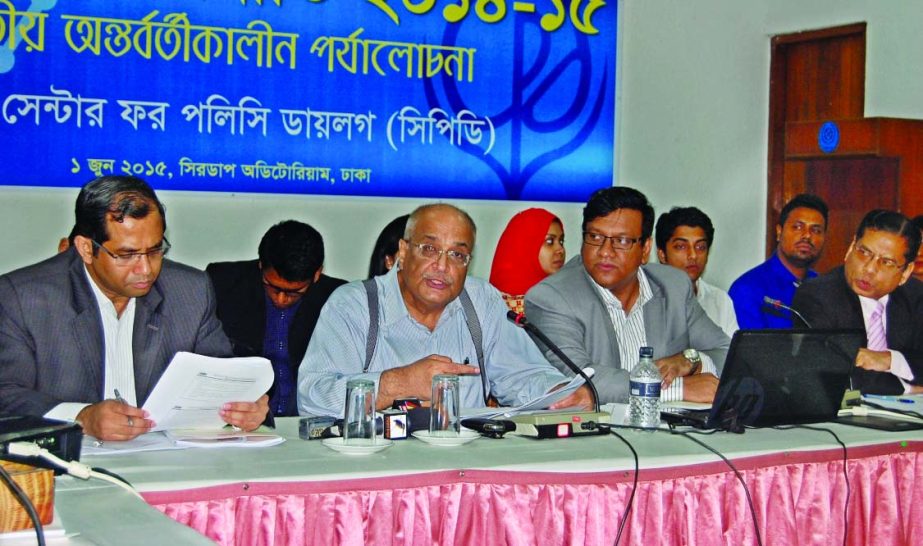
Staff reporter :
Speaking at a seminar, country’s think tank Centre for Policy Dialogue (CPD) fellows on Monday observed that the country should take advantage of its current macroeconomic stability to drive economic and institutional reforms in order to break the stagnant six percent growth.
The observations emerged at a media briefing on “State of the Bangladesh Economy in FY2015 and the Closure of Sixth Five Year Plan,” at CIRDAP auditorium in the city.
The media briefing was jointly organised by CPD and Independent Review of Bangladesh’s Development (IRBD) programme.
Speaking the media briefing, CPD Fellow Dr Debapriya Bhattacharya underscored the need for a great extent of economic reform for reducing poverty and economic disparity from the country.
Considering the present situation of the country, most of the economic indicators are positive and a good number of positive development activities were executed in the country.
The CPD fellow suggested for formulation of five independent committees to look after the development programmes of the government across the country.
Dr Debapriya Bhattacharya underscored that the question is whether Bangladesh economy can reach its potential growth targets through enabling policies and congenial political environment in the years to come before 2021.
In this regard, the seventh five-year plan, policy coherence, strengthened governance and quality of public expenditure will be critical for realising the growth and development targets as set in the Vision 2021, he also said.
CPD Research Fellow Towfiqul Islam Khan presented a key note. The aim of the paper is to mainly looked at macroeconomic management in FY2015 and outlook for FY2016, recent dynamics of rice price in Bangladesh, assessment of progress of fast track projects and analysis of implementation of the sixth five-year plan (SFYP).
He mentioned that Bangladesh economy is experiencing a number of macroeconomic advantages including lower inflation, declining interest rate, stable exchange rate, manageable fiscal deficit, positive balance of payment, augmented foreign exchange reserve and low level of global commodity prices including that of oil.
However, acceleration in private investment remained an illusive goal while NBR’s tax revenue collection growth was below target despite having import duty and supplementary duty collections on track. The fiscal planning for FY2016 will require significant mid-term corrections to achieve a realistic revenue target, noted Towfiqul Islam Khan.
CPD Executive Director Professor Mustafizur Rahman mentioned that overall progress was unsatisfactory and the government should take responsibility for successful completion of the projects at economically viable cost with good governance.
Additional Director of CPD Khandaker Golam Moazzem and Research Fellow of CPD Towfiqul Islam Khan, were also present the media briefing.
Speaking at a seminar, country’s think tank Centre for Policy Dialogue (CPD) fellows on Monday observed that the country should take advantage of its current macroeconomic stability to drive economic and institutional reforms in order to break the stagnant six percent growth.
The observations emerged at a media briefing on “State of the Bangladesh Economy in FY2015 and the Closure of Sixth Five Year Plan,” at CIRDAP auditorium in the city.
The media briefing was jointly organised by CPD and Independent Review of Bangladesh’s Development (IRBD) programme.
Speaking the media briefing, CPD Fellow Dr Debapriya Bhattacharya underscored the need for a great extent of economic reform for reducing poverty and economic disparity from the country.
Considering the present situation of the country, most of the economic indicators are positive and a good number of positive development activities were executed in the country.
The CPD fellow suggested for formulation of five independent committees to look after the development programmes of the government across the country.
Dr Debapriya Bhattacharya underscored that the question is whether Bangladesh economy can reach its potential growth targets through enabling policies and congenial political environment in the years to come before 2021.
In this regard, the seventh five-year plan, policy coherence, strengthened governance and quality of public expenditure will be critical for realising the growth and development targets as set in the Vision 2021, he also said.
CPD Research Fellow Towfiqul Islam Khan presented a key note. The aim of the paper is to mainly looked at macroeconomic management in FY2015 and outlook for FY2016, recent dynamics of rice price in Bangladesh, assessment of progress of fast track projects and analysis of implementation of the sixth five-year plan (SFYP).
He mentioned that Bangladesh economy is experiencing a number of macroeconomic advantages including lower inflation, declining interest rate, stable exchange rate, manageable fiscal deficit, positive balance of payment, augmented foreign exchange reserve and low level of global commodity prices including that of oil.
However, acceleration in private investment remained an illusive goal while NBR’s tax revenue collection growth was below target despite having import duty and supplementary duty collections on track. The fiscal planning for FY2016 will require significant mid-term corrections to achieve a realistic revenue target, noted Towfiqul Islam Khan.
CPD Executive Director Professor Mustafizur Rahman mentioned that overall progress was unsatisfactory and the government should take responsibility for successful completion of the projects at economically viable cost with good governance.
Additional Director of CPD Khandaker Golam Moazzem and Research Fellow of CPD Towfiqul Islam Khan, were also present the media briefing.

